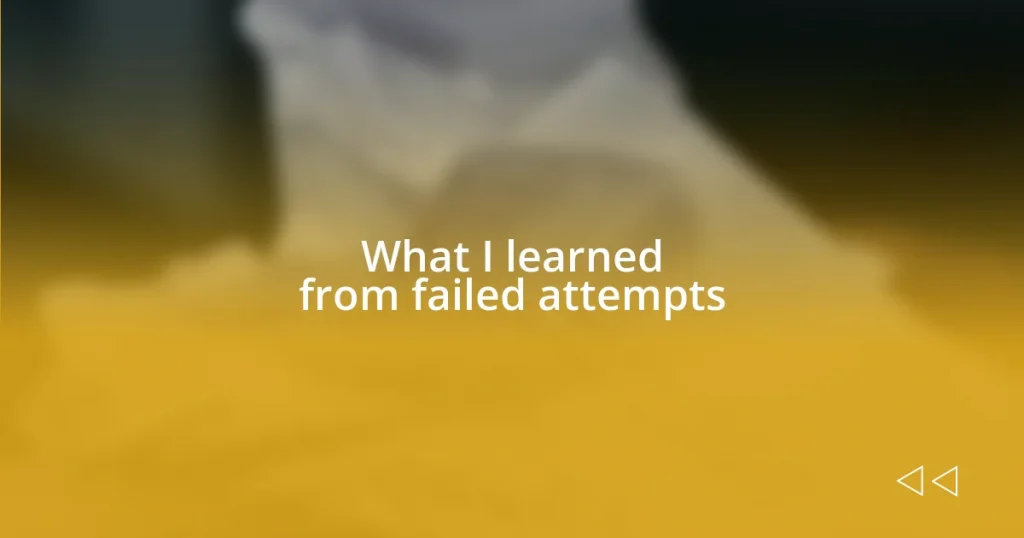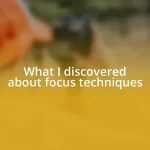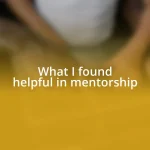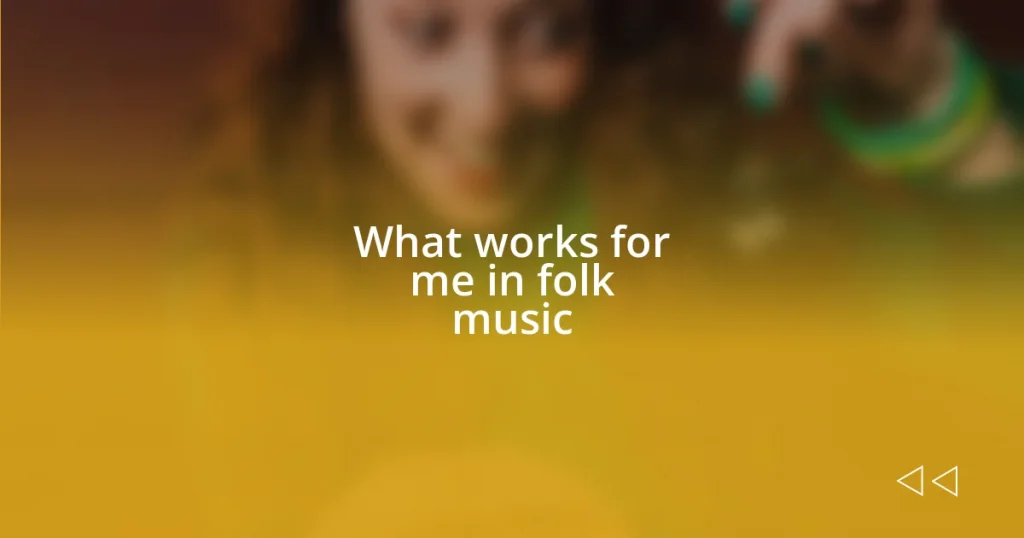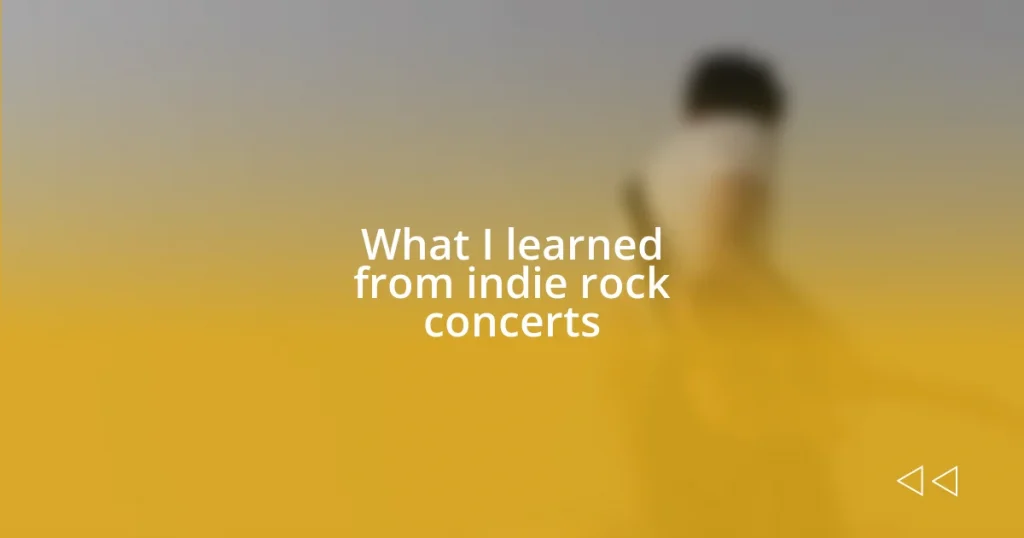Key takeaways:
- Failure is a valuable source of growth and resilience, often leading to personal and professional development through reflection and learning.
- Recognizing the lessons embedded in setbacks, such as the importance of vulnerability and team collaboration, can transform challenges into opportunities for improvement.
- Embracing the process of failure encourages adaptive strategies and enhances future performance, guiding individuals toward more mindful and informed approaches in their endeavors.
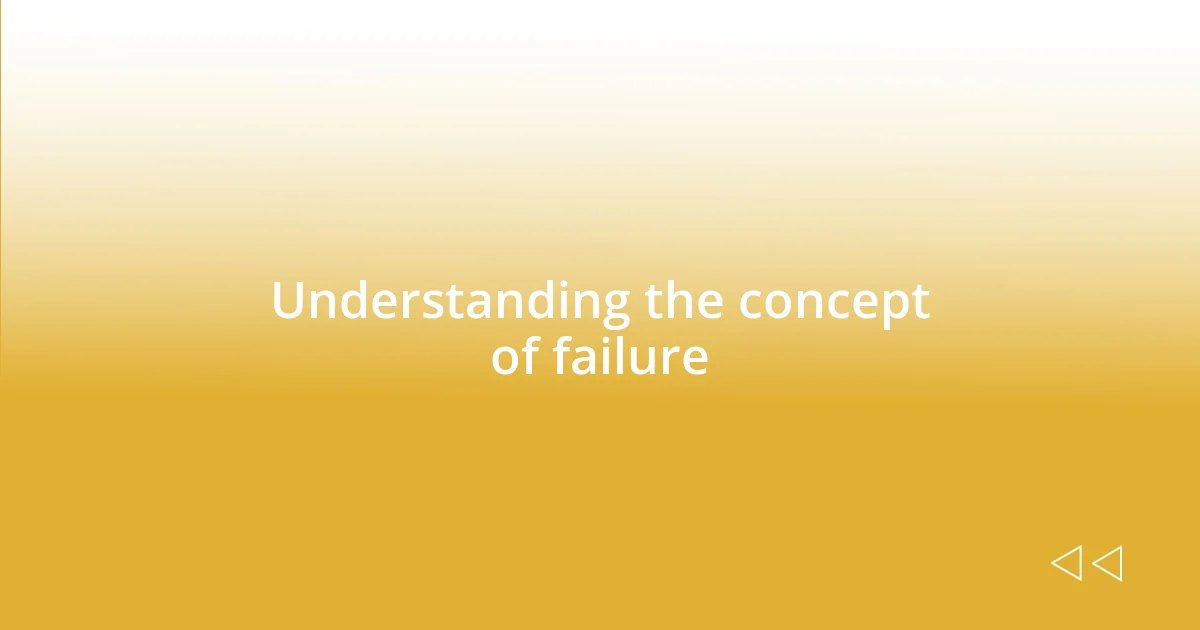
Understanding the concept of failure
Failure is often viewed as a negative endpoint, but I see it as an opportunity for growth. When I first attempted to start my own business, I put in countless hours only to see it falter. The emotional weight of that experience was heavy, but looking back, what I gained in terms of resilience and knowledge far outweighs the sting of failure.
Have you ever felt that pit in your stomach when you realized things weren’t going as planned? I remember a time when I bombed an important presentation. I thought it was the end of my career. Surprisingly, it became a turning point. I learned to analyze what went wrong, which led me to refine my skills, ultimately becoming a more confident speaker.
Failure can feel isolating, yet it’s a universal experience. Each attempted step that leads to a stumble offers valuable insights into our strengths and weaknesses. I’ve come to appreciate that my most profound lessons have emerged from moments of struggle rather than success; these instances are what shaped me. Isn’t it fascinating how much we can learn from our missteps?
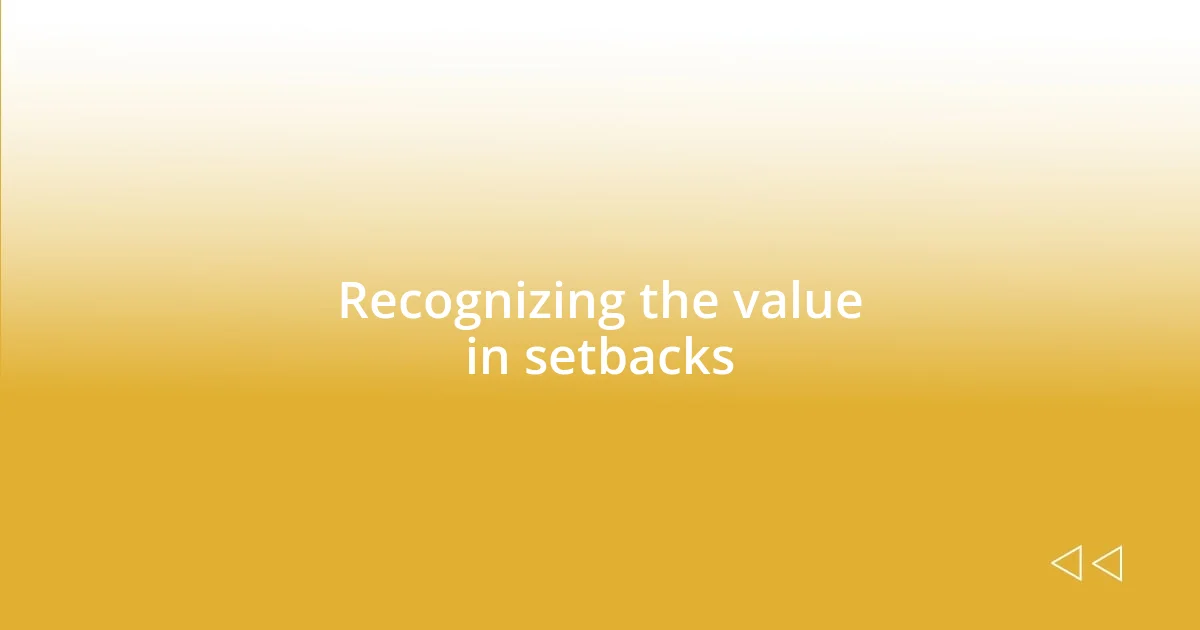
Recognizing the value in setbacks
Recognizing the value in setbacks is crucial for personal development. I recall a time when I led a team project that completely missed the mark. The disappointment was palpable, not only for me but for my colleagues. Instead of wallowing in the failure, I took that opportunity to gather everyone for a candid discussion. It amazed me how much honesty fostered a stronger team bond and sparked a fresh perspective on our goals. We emerged not defeated but invigorated, ready to tackle future challenges with a new approach.
Sometimes, I find myself reflecting on my career’s winding path. There was a moment when a job I desperately wanted slipped through my fingers. At first, I felt crushed and questioned my worth. However, in that period of introspection, I discovered aspects of my professional identity that I had overlooked. This setback became a profound teacher, forcing me to redefine what I wanted, thus leading me to an even better opportunity later on. Isn’t it intriguing how a seemingly negative experience can redirect our journey towards something greater?
Setbacks often reveal previously hidden strengths and ignite our potential. One particularly tough failure in a personal endeavor taught me that vulnerability can be a source of strength. Instead of attempting to shield my emotions, I shared my struggles with close friends. Their support not only cheered me on but gave me valuable perspectives on my situation. This laid the groundwork for a much healthier approach to challenges—I learned the importance of connection and the power that comes from being open about setbacks.
| Setback Experience | Lesson Learned |
|---|---|
| Failed Team Project | Strengthened team bond and fresh perspectives |
| Lost Job Opportunity | Redefined personal and professional goals |
| Sharing Personal Struggles | Importance of vulnerability and connection |
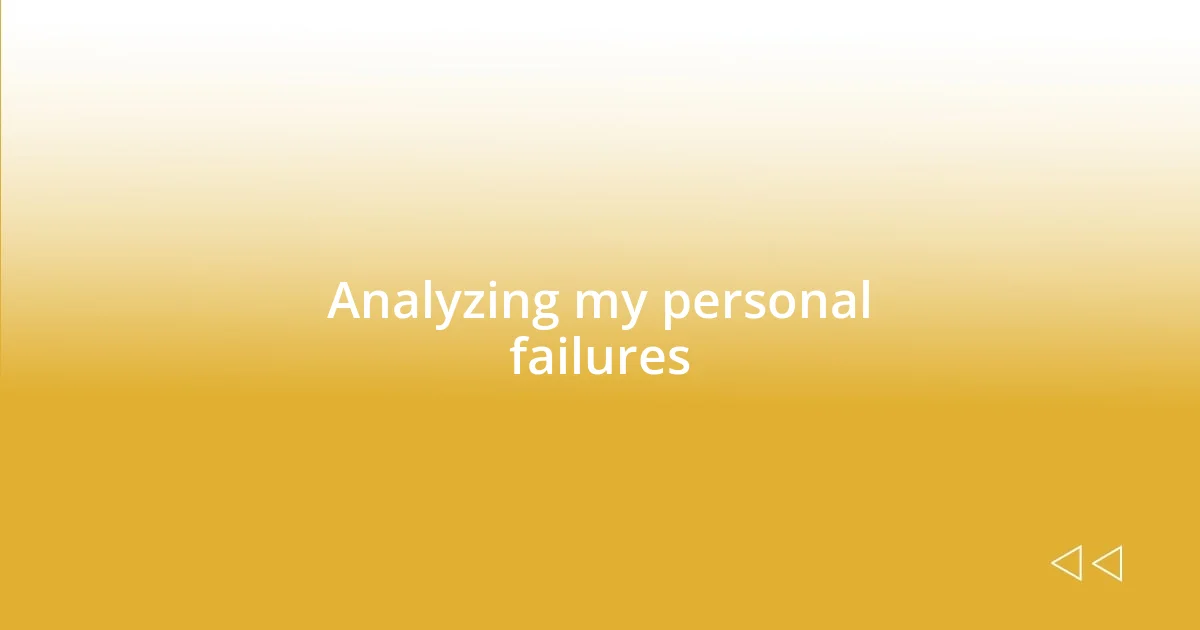
Analyzing my personal failures
Reflecting on my personal failures has been an eye-opening journey. One memorable instance involved a crucial writing project I believed was my ticket to recognition. When it was met with criticism instead of praise, the initial sting was tough to handle. Yet, that moment nudged me into a deeper analysis of my writing style and audience engagement. I realized that the feedback—while hard to accept—was invaluable in sharpening my skills and expanding my perspective.
- I learned that criticism often comes from a place of care and insight.
- I discovered my tendency to take feedback too personally, hindering my growth.
- I understood the importance of seeking constructive criticism before launching my work.
I recall another situation where I committed to a leadership role in a community initiative. I felt so sure of my plans, only to see them unravel in unexpected ways. I grappled with disappointment, but in dissecting what went wrong, I identified gaps in my planning and communication. That analysis was liberating. I transformed those lessons into actionable strategies for future endeavors, which eventually led to a successful initiative later on. It’s fascinating how such moments of failure can serve as enlightening teachers, pushing us toward more thoughtful approaches.
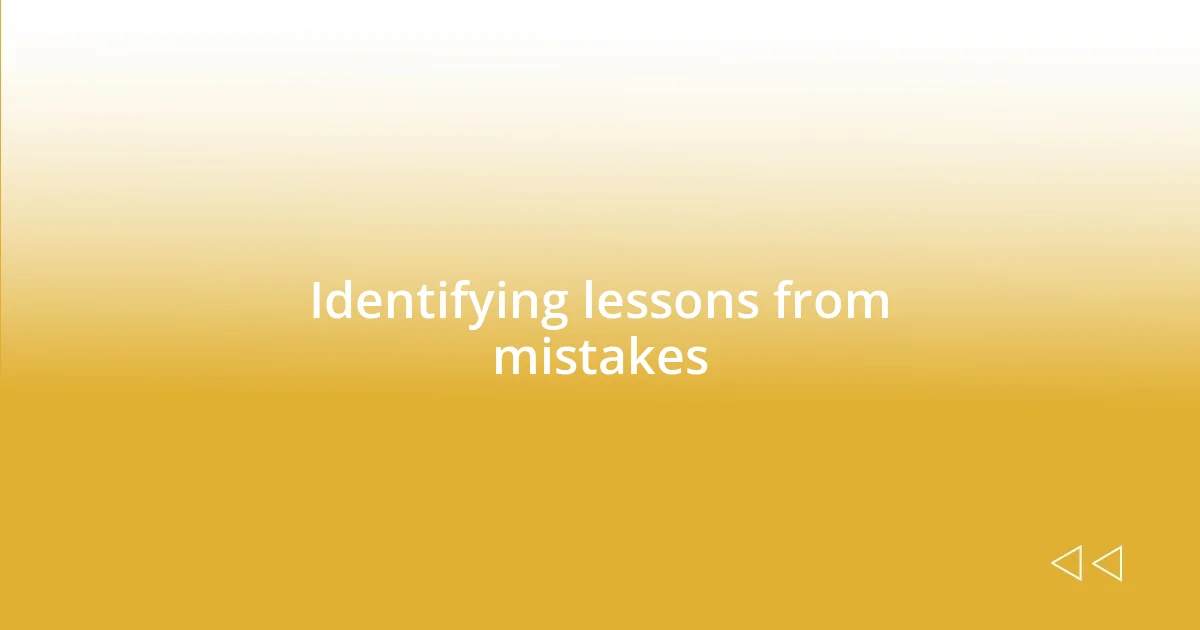
Identifying lessons from mistakes
I’ve found that embracing mistakes often unveils unexpected insights. There was a time when I tried to launch a small online business, thinking I had everything figured out. However, it bombed spectacularly, leaving me bewildered. Instead of feeling defeated, I took a moment to analyze the missteps. What I discovered was eye-opening: I hadn’t fully understood my target audience. That realization reshaped my approach to future projects, reminding me that knowing your audience is paramount to success.
Allowing myself to dig deeper into failures has been transformative. I remember a time when I severely underestimated the challenges of a group presentation. The nerves got the better of me, and I stumbled through my points. While it felt like a disaster in the moment, I later recognized this experience highlighted my need for better preparation and practice. I started to ask myself, “What could I have done differently?” By confronting those tough questions, I developed strategies to bolster my confidence before speaking in public, ultimately leading to a smoother delivery in future presentations.
One experience that stands out was missing an important deadline. Initially, I felt a rush of shame and frustration—but then I chose to reflect instead of dwell. In my analysis, I uncovered my tendency to procrastinate and how it stemmed from fear of not being perfect. I realized that every time I hesitated, I missed out on valuable opportunities. This sparked a personal commitment to change that habit; I began utilizing tools like time-blocking. Isn’t it fascinating how a moment of failure can inspire newfound determination? It’s these kind of lessons that propel us forward in our personal and professional lives.
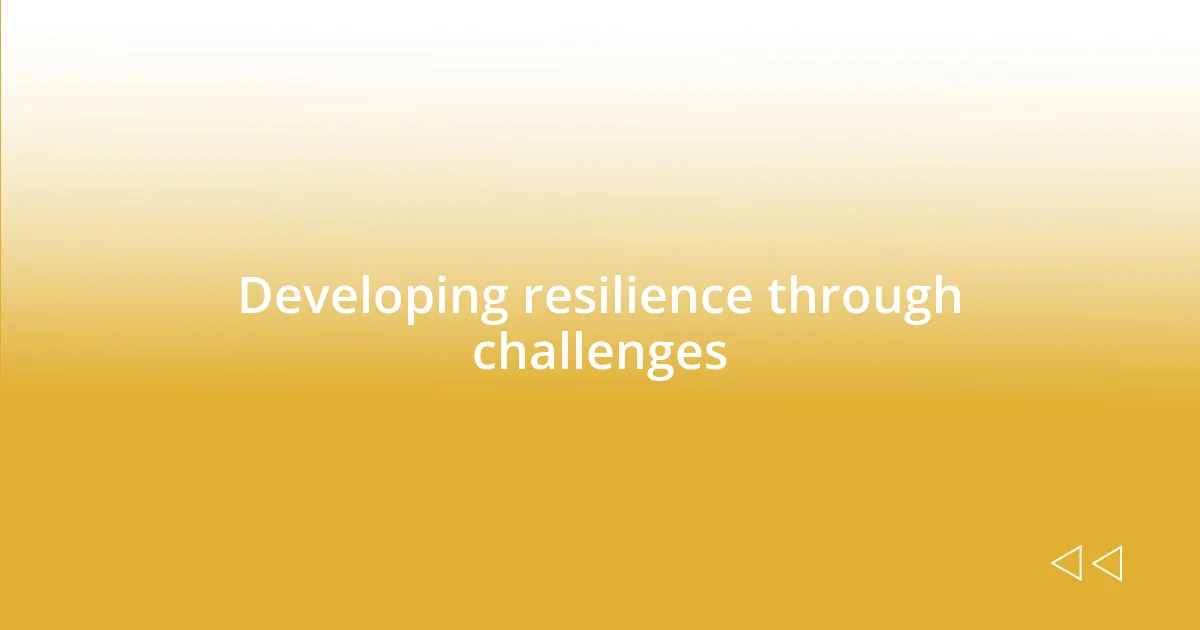
Developing resilience through challenges
Navigating challenges truly cultivates resilience, and I can attest to that from my own experiences. I recall a time when I decided to take on a complex project at work, believing this could significantly boost my career. When it fell short of expectations, I felt like I hit rock bottom. However, in the aftermath, I began to dissect what went wrong. I discovered that embracing discomfort and uncertainty was crucial. This epiphany helped me reframe future challenges not as threats but as opportunities for growth.
Another poignant moment was during a particularly challenging workout regimen. I aimed to achieve a fitness goal that seemed feasible but soon became an uphill battle. Each failed attempt left me in distress, questioning my commitment and abilities. Instead of surrendering, I took those setbacks to heart and adjusted my methods. This journey taught me that it’s essential to adapt and persist, understanding that resilience isn’t just about bouncing back; it’s about evolving amidst adversity.
Have you ever felt overwhelmed by a personal setback, wondering if you could face challenges again? I remember standing in front of a mirror after a failed personal project, grappling with feelings of inadequacy. In time, I learned to lean into those feelings instead of allowing them to control me. Every failure became a stepping stone, reminding me how critical it is to forge ahead, armed with the lessons learned. Resilience isn’t merely about enduring hardships; it’s about embracing the entire process of learning and growing.
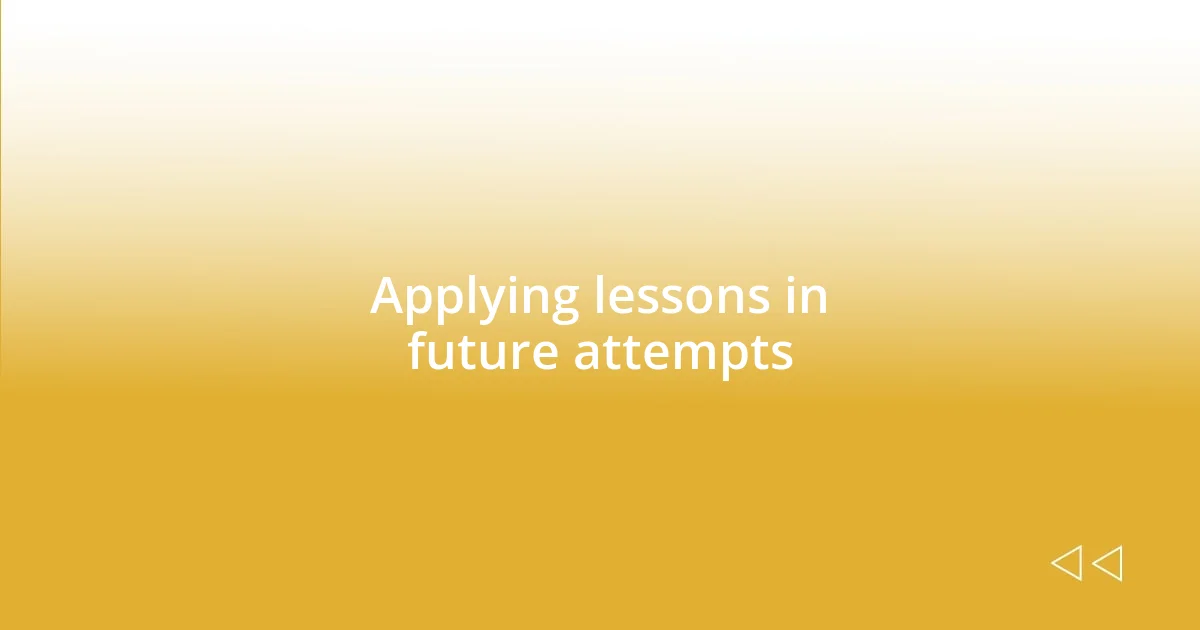
Applying lessons in future attempts
When I think about applying lessons from previous setbacks, a vivid experience comes to mind. I vividly remember the first time I attempted to launch a social media campaign for a client. I had grand ideas, but I overestimated our resources and underestimated the time required. The campaign flopped, and I felt a mix of embarrassment and frustration. Instead of brushing it off, I took a deep breath and asked myself, “What if I approached this differently next time?” This moment became a pivotal lesson: planning and realistic goal-setting can make all the difference. So, I refined my approach, ensuring I set achievable milestones and communicated clearly with my team.
Experiencing failure can be a tough pill to swallow, right? I remember a time during a volunteer project when my plan for community outreach utterly missed the mark. The turnout was disheartening, and I couldn’t shake off a feeling of defeat. But instead of giving in, I gathered feedback and reflected on what went wrong. I realized that I hadn’t connected with the community’s interests. This sparked a new strategy for future engagements—I began conducting informal surveys and involving stakeholders. It turned that failure into a rich source of learning, guiding my future interactions. Isn’t it interesting how one moment can lead you to a much better path?
Sometimes, applying lessons means confronting uncomfortable truths. After a particularly grueling job interview that I felt went horribly wrong, I was adamant that I wouldn’t let it define me. I remember stewing over my lack of preparation for those tricky behavioral questions. In that moment of self-reflection, I decided to embrace a rigorous mock interview process. This shift not only boosted my confidence but honed my ability to articulate my experiences effectively. I came to understand that failure isn’t the endpoint; rather, it’s a catalyst for growth. Isn’t that what makes the journey worthwhile? Each stumble brings us closer to our goals.
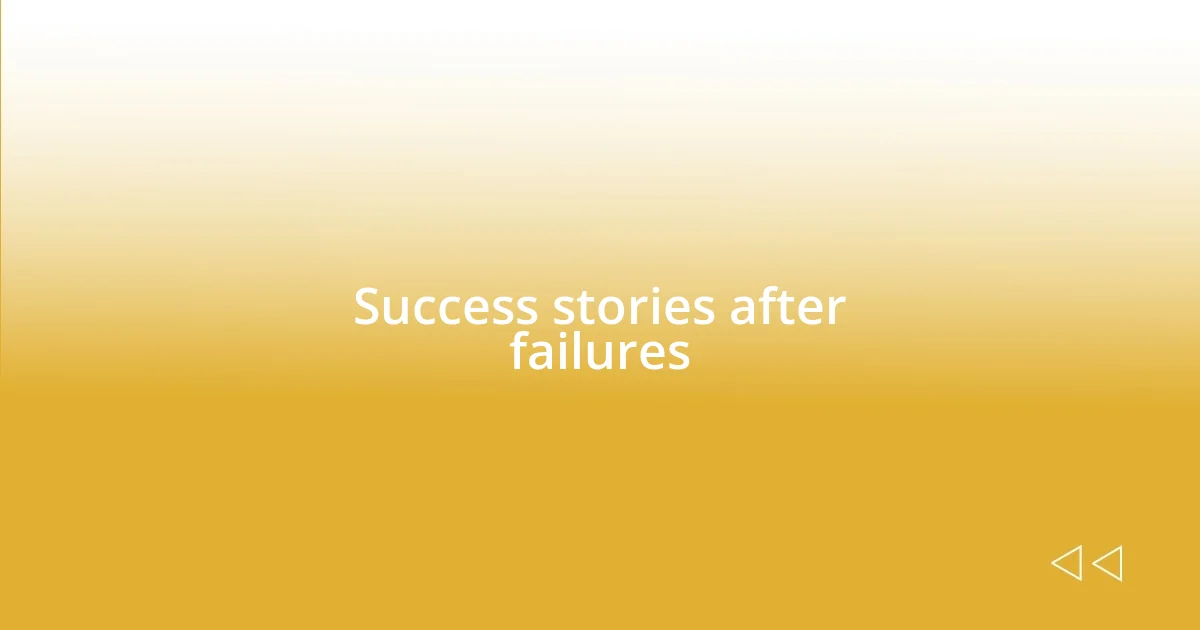
Success stories after failures
Reflecting on my own journey, one standout moment was when I attempted to write my first novel. The initial draft felt like a chaotic mess, and my enthusiasm quickly turned into disappointment. However, instead of abandoning the project, I embraced the failures I encountered, learning each word could be a step towards refinement. This experience taught me that even the roughest drafts hold the potential for brilliance. Have you ever faced the daunting reality that what you create may not meet your own expectations? I realized that those moments of doubt could serve as a rich source of inspiration, guiding me to explore deeper layers of my storytelling.
In another instance, I took a leap into an entrepreneurial venture that ultimately flopped. I poured resources into a product that I believed would be a game-changer, only to find that it didn’t resonate with my audience. The heartbreak was palpable, yet in the days that followed, I engaged in thorough market research and conducted honest conversations with potential customers. This process reshaped my understanding of what they truly valued. I learned that listening is just as vital as crafting. Isn’t it fascinating how a setback can redefine our approach and spark new ideas?
Then there’s the time I tried learning to play the guitar. At first, my fingers fumbled over the strings, and I often felt like giving up. But rather than seeing each missed chord as failure, I started to appreciate the grind, the discomfort of growth. Slowly, those awkward moments morphed into beautiful sounds, and I found joy in the learning process itself. Have you experienced a similar transformation when you embraced your struggles? In asking myself this, I understood that every note I struggled to play was a testament to my progress, reminding me that success is often built on a foundation of failures.










